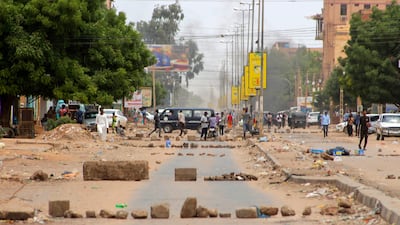The death toll from tribal clashes in Sudan’s Blue Nile state has risen to 65, authorities in the southern region said on Sunday.
The Blue Nile’s Health Ministry said 192 people were injured in the clashes, which began nearly a week ago.
The latest death toll is nearly 30 more than the number given by the local Blue Nile government late on Friday.
The clashes prompted the local government on Friday to impose a night-time curfew and ban gatherings in two provincial cities — Rosiris and Damazin.
Police and army reinforcements have been sent to the state to restore order.
There are conflicting reports on what started the violence between members of the rival Berti and Hawsa tribes.
Initially, the violence was said to have been caused by the killing of a farmer, but reports later said it was due to the rejection by the Berti tribe of a Hawsa request to create a civil authority to supervise access to land.
But the Berti tribe said the violence broke out when it responded to a "violation" of its lands by the Hawsas.
A major rebel group that once fought the government in Blue Nile state – the Sudan Popular Liberation Movement-North — said the violence followed the local government’s refusal to endorse the creation by the Hawsas of a body to run their tribe’s affairs.
The group denied involvement in the violence.
In Khartoum on Sunday, the Security and Defence Council led by military ruler Gen Abdel Fattah Al Burhan ordered the attorney general to investigate the clashes in Blue Nile.
Gen Al Burhan urged the local government to swiftly bring to justice anyone found responsible for the violence.
The council is made up of top military, police and security officials.
Sudan is an ethnically and religiously diverse country of 41 million people that has suffered civil wars since independence in 1956.
At present, it is mired in a political and economic crisis that began when the military seized power in a coup last October that derailed the country’s fragile democratic transition.
The Blue Nile province is in the south of the country and shares a border with Ethiopia.
It was torn for years by fighting between government troops and rebels disgruntled by what they see as the monopoly on power and national resources by the north of the country.
Some rebel groups there, including the SPLM-North, and the country’s military signed a peace deal in October 2020 but security is still fragile.
Only weeks ago, tribal fighting in the restive Darfur region in western Sudan killed hundreds, injured thousands and forced tens of thousands out of their homes.
News of the higher death toll in Blue Nile coincided with another day of street rallies in Khartoum against military rule, with police using tear gas and water cannon to disperse hundreds of protesters.
Many of Sunday’s protesters referred to the events in Blue Nile in their chants and the banners they carried.
"Sudan is one nation" and "No to racism, no to tribalism," some chanted.
In the city of Wad Madani, about 200 kilometres south of Khartoum, protesters diverted their demonstration to the local hospital to "donate blood to our brothers wounded in tribal clashes in Blue Nile", protest organiser Ammar Mohammed said.
Pro-democracy demonstrators accuse Sudan's military leadership and ex-rebel leaders who signed the 2020 peace deal of exacerbating ethnic tensions in Blue Nile for personal gain.
Experts say last year's coup created a security vacuum that has fostered a resurgence in tribal violence, in a country where deadly clashes regularly erupt over land, livestock, access to water and grazing.
Guerrillas in Blue Nile battled former dictator Omar Al Bashir during Sudan's civil war between 1983 and 2005. They took up arms again in 2011.
Additional reporting by AFP












